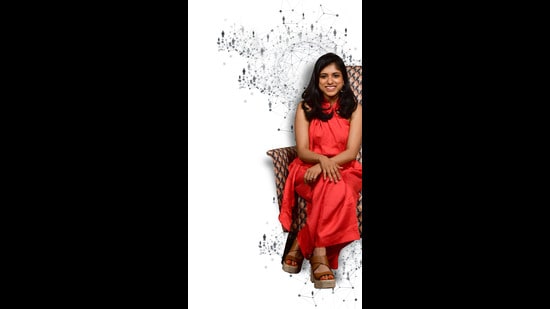Prompt response: A Wknd interview with Madhumita Murgia, author of Code Dependent
Murgia's new book explores how AI is affecting lives; how the faultlines of capitalism are showing up, in what was meant to be a flatter, fairer, braver world.
The story of artificial intelligence is not the story of rockstar CEOs and Silicon Valley geeks. It is not really about Big Tech’s sizzling stock prices and unicorn start-ups.

The AI story is about you and me; our days, our jobs, our way of life.
But there is currently little acknowledgement of this. We marvel at AI’s progress and potential, experts drone on about use cases. But we avert our eyes from the plight of the poor and the powerless caught in its crosshairs. And we do this at our peril, because we are at least one of those things.
This is something Madhumita Murgia underscores both subtly and undeniably in her debut book, Code Dependent: Living in the Shadow of AI (March; Picador / Pan Macmillan).
Murgia, 36, the first-ever AI editor at the Financial Times, UK, does this through stories about how AI is already affecting ordinary people’s lives.
In Chinchpada village in Nashik, Maharashtra, we glimpse how algorithms can help doctors in the resource-starved public healthcare system with diagnoses, analysis and care. But we are also transported to low-income settlements in Nairobi, Kenya, and refugee housing in Sofia, Bulgaria, where workers are being pushed to label more data per hour, in the unceasing effort to train the AI juggernaut that is always waiting to be fed.
The book offers first-hand accounts of women who have had deepfake images and videos of themselves uploaded on pornographic websites, and we see what such manipulation can do to the life of an ordinary person going about their day.
Code Dependent ropes in gig workers, who talk about how the algorithms have made their precarious lives more uncertain, as they facelessly recalculate work allocations and wages in ways that are not just complex and opaque, but leave no room for contestation, protest or a court of appeal. Many customers will identify with the frustration this can cause; now imagine if that wasn’t a misplaced order, but your livelihood, at stake.
Livelihoods are already at stake. In the massive data-labelling industry that has sprung up around the world, this vital if mundane work earns employees cents per labelling task.
Should they not be paid commensurate with their contribution, Murgia asks. In her question are echoes of the firebrand Telugu poet Sri Sri (Srirangam Srinivasa Rao; 1910-1983), who asked in his seminal work Maha Prasthanam (The Great Journey to a New World):
“Taj Mahal nirmaanaaniki raallettina koolilevvaru?”
(On whose bent backs were the marble stones of the Taj Mahal carried?)
***
The individual stories in Murgia’s book, fascinating as they are, are connected by deeper underlying themes: The concentration of tremendous power, the lack of state capacity to regulate, the turbo-charging of the surveillance state, the rising power of capital versus the declining say of labour.
Murgia points to how the faultlines of capitalism — where the rewards of innovation accrue to a tiny minority, despite the vast labour majority required to realise the potential of that innovation — are already being mirrored in what was meant to be a flatter, fairer, braver world.
Will artificial intelligence act as a counterweight to these trends, or an accelerant?
The trade-offs required are already complex, and we’ve only just begun.
Which is why Code Dependent offers a clarion call: This is not a matter of a near-future; it is a matter of now. If we cannot build a new social contract, we need to ask ourselves: What rights can any of us hope to retain?
Where do we go from here? Where would Murgia like to see things go. Excerpts from an interview.
* Will AI disproportionately benefit the wealthy while its harms fall disproportionately on the marginalised?
I would say that that’s exactly what I discovered during the reporting of this book. I went into it agnostic. I was curious to see how AI has changed lives, for better and worse and everything in between.
The healthcare case with Dr Ashita Singh in Chinchpada was the shining spot. Everywhere else, I saw the harms of AI: bias, hallucinations, errors in decision-making systems, discriminatory outcomes.
We need to think not just about how the technology itself works, the biases within the systems, and who it is all harming, but also: How do we bring this to the people who need it the most? Who is going to subsidise that? And who is accountable when these systems go wrong?
I saw multiple examples, whether with predicting crime amongst children in Amsterdam or with deepfake pornography, where things went very wrong but there was nobody you could hold responsible.
Accountability should be a big part of rolling AI out across society.
* Is data colonialism a risk too? Are non-Western voices being inadequately represented, as this technology is shaped?
We don’t have enough representation from different cultures, and partly that’s because the infrastructure, the money, the chips and the expertise are highly concentrated in the West, and possibly in China. In terms of solutions, India and other countries are starting to think about how they can build their own systems.
I think open-source models are a big way in which we can democratise that process. The more we can have engineers and computer scientists access these models and build with them, the more we’ll be able to have a thousand flowers bloom, essentially, around the world.
* You’ve written in the past about AI and climate…
The energy question is huge. Many of the Big Tech companies are trying to offset the impacts of their data centres, but that’s all going to be reversed if you’re trying to build a massive trillion-parameter model with millions of chips. There is going to be an impact on the environment.
It is said that one of the goals is to essentially use AI to make an energy breakthrough and have it solve the problem of powering itself. But that’s nowhere near a reality yet.
* What gives you hope, when it comes to artificial intelligence?
With my immunology and biology background, science and healthcare are the areas that I think could be transformed for the better. It could help us not just make breakthroughs but take those to people that we don’t reach today.
That’s where I feel really excited and optimistic. I’m excited to see this change.
.
THE TINY BIO
* Madhumita Murgia, 36, was born in Bengaluru, to a family with roots in Chennai. She grew up in Mumbai and moved to the UK for college, where she earned a Bachelor’s degree in biology and a Master’s degree in immunology, both from Oxford. She also has a Master’s degree in science journalism from New York University.
* Murgia’s first job as a journalist was at Wired magazine, where she wrote widely acclaimed stories on the data-broking business. She moved on to The Telegraph, where she continued to report on evolving technology; then to the Financial Times, in 2016. She has reported on artificial intelligence for more than a decade.
* The idea for her book, Code Dependent, came to her while she was on maternity leave, following the birth of her second daughter. Murgia says the time away from work allowed her to step back from it all and zoom out. The book has been shortlisted for the inaugural 2024 Women’s Prize for Non-Fiction, which celebrates narrative non-fiction by women.
Continue reading with HT Premium Subscription






